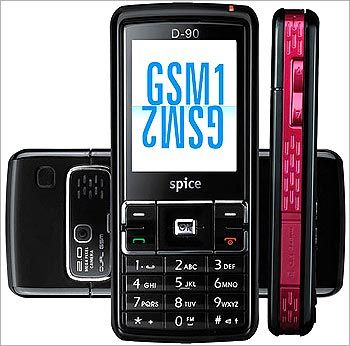 | « Back to article | Print this article |
 Tariffs of post-paid customers are expected to fall, as telcos -- particularly new operators -- brace for a price war with the launch of mobile number portability (MNP) on Thursday from Rohtak in Haryana. MNP allows customers to retain their number while changing their operators.
Tariffs of post-paid customers are expected to fall, as telcos -- particularly new operators -- brace for a price war with the launch of mobile number portability (MNP) on Thursday from Rohtak in Haryana. MNP allows customers to retain their number while changing their operators.
Telcos say tariffs could be cut by up to 20 per cent. While post-paid customers constitute only 5 per cent of the total customer base of 670 million, they make up over 15 per cent of revenues thanks to their relatively higher average revenue per user (Arpu).
Says Sistema Shyam CEO Vsevolod Rozanov: "We expect a price war in the post-paid market, where customers have been loyal to their operators for a long while. Also, most of the fall in tariffs that we saw in the last few years has been in the pre-paid category. We expect tariffs to fall by double digits."
New players like Sistema see an opportunity to grab customers from incumbent operators, who have congested networks.
J Gopal, executive director of Mahanagar Telephone Nigam, confirmed the likely fall in tariffs: "By how much is tough to say, because that will depend on how many people leave or come into the network. We are hoping to get a large number of consumers after MNP."
New private operators say that they will now use this one-time opportunity to garner high-Arpu customers by offering them a better network. "We see tariffs falling by 20 per cent. Our strategy will be to get high-paying customers, who are unhappy with congested incumbent networks and give them an alternative at a lower price," said a top executive with a new operator.
Operators say the big challenge will be corporate accounts, where operators offer managed services -- a Rs5,000-crore market in which mobile revenues are nearly half that include mobile connections to employees.
It is a market that Reliance Communications, for instance, is planning to address by weaning away accounts.
Executives in the company say this market will also see a price war, as incumbents have to drop tariffs by around 15 per cent to ensure that they do not lose customers. New companies that do not have a large post-paid base have nothing to lose by dropping tariffs and garnering incremental business.
But incumbent operators, while agreeing that the initial churn might go up by 5 percentage points, do not see any tectonic shift in consumers due to MNP. The current industry trend is a 7-10 per cent churn, which simply means that every customer changes his or her operator once a year.
"You might see an overall tariff drop of 5 per cent by new players, but that cannot be a differentiator, as it will be matched by others," said a source at Vodafone-Essar.
However, some experts say the MNP battle will be fiercest in the post-paid market. "We strongly believe that MNP could be a game-changer in the Indian wireless space, more so in high-Arpu subscriber segments, where churn rates remain low," said Satish Seth, group managing director of Reliance Communications, in a conference call.
"The lower end of the market looks for the best possible offer. After MNP comes in, behaviour in the high net-worth segment might change. Since there are few differentiators in the service offered, churn could go up," said Romal Shetty, head of telecom at KPMG.
"This could be only a temporary phenomenon. In the long-term, high-end subscribers prefer good network coverage and service, and incumbent operators will score. We don't expect anything so spectacularly different that would change the dynamics of the game," countered Sangeeta Tripathi, a telecom analyst with Sharekhan.